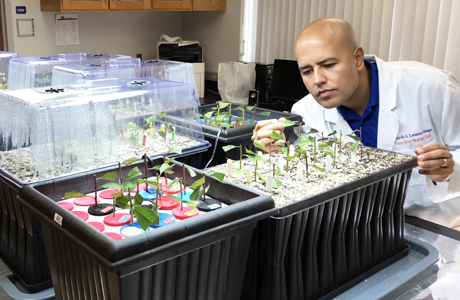Ricardo Lesmes
PhD Graduate Student
Ricardo A. Lesmes-Vesga, a native of the Colombian Andes Mountains region, is pursuing a PhD in Horticultural Sciences.
Lesmes-Vesga completed a BSc in Agronomy at the National University of Colombia, where his senior project involved different concentrations of salt in irrigation water given to lettuce plants. His next step was to earn a Specialist in Company Management degree from the Free University of Colombia, where he designed and implemented a company improvement plan to introduce a competitive business strategy. Over the course of his studies, Lesmes-Vesga's strategy involved protected agriculture. He then earned a MSc degree in Protected Horticulture at the University of Almería in Spain.
Lesmes-Vesga worked evaluating alternative substrates for soilless crop production in Almería. He found Almería’s greenhouses to be unique to that region only, built from vine arbor structures, or plastic panels supported by a network of metal wires, sandwiched plastic with nets of wires. Most of the fruit and vegetables exported to Europe during the winter are produced in Almería. The region’s export markets now include Russia and China. A new commodity for the plastic greenhouse farmers are perennial fruits, like Japanese medlar.
Ricardo's work to earn a Master of Science degree in Protected Crop Plant Production with the University of Almería involved drainage quality and growth parameters for strawberry plants. He sought a doctorate program in Florida to study under an innovative scientist with expertise in plant root biology and found Dr. Lorenzo Rossi.
Rossi, along with Dr. Jose Chaparro at UF in Gainesville, direct Lesmes-Vesga’s research. Their work involves development of plant materials to develop the most suitable peach tree rootstocks for Florida's different soils.
Lesmes-Vesga said rootstocks must match the needs of specific production regions in Florida. To root cuttings from saplings grown inside a greenhouse, Lesmes-Vesga roots the cuttings with which he has developed a rooting protocol. Lesmes-Vesga will observe the new root system over time in a device called a rhizotron, in which the new root system is enclosed between two glass panels and inside soil. Over time Lesmes-Vesga will observe new root systems, collect data, and analyze the growth and charachteristics of the rooting systems within the rhizotron.
Along the coast where Flatwoods soils are found, roots must be shallow to manage flooding. In other soils in northern Florida, roots must grow deep to access nutrients beyond sandy soils. Lesmes-Vesga expects to identify which rooting systems will be more suitable for which production regions. With this data he will recommend what plant materials peach tree breeders may use for nursery trees that will be designated for Florida's different growing regions.

Contact
Room #115
Indian River Research and Education Center
2199 South Rock Road
Fort Pierce, FL 34945-3138
ricardolesmes@ufl.edu
-
Education
- PhD student, Horticultural Sciences, University of Florida, in progress
- MSc, Protected Crop Plant Production, Almería University, 2012
- Specialist in Company Management, Free University of Colombia, 2013
- BSc, National University of Colombia, 2007
-
Research Publications
- "Soilles culture, other way to produce food," INTEGRA Journal, Vol. 5, 2016.
- "Evaluate Pre-germination treatments on coffee seeds (Coffea arabica L.) variedad Castillo." SENNOVA Journal, Vol. 2, No. 1, 2016, pp. 137-161.
- "Analysis of Lippia alba essential oil production through steam stripping distillation in a mobile plant." INTEGRA Journal, Vol. 1, January - July 2015.
- "Evaluation of salt (NaCI) concentrations in irrigation wter on lettuce (Lactuca sativa L.) on 'Batavia' growth." Colombian Journal of Horticultural Sciences, December, 2007, Vol. 1, No. 2, pp. 222-235.
-
Awards and Service
Honor
- Higher Education Quality Test, Examen de la Calidad de la Educación Superior (ECAES) 120,1/150. Top 10 in the nation of Colombia, called for talent program "Semillero de Talentos," COLFUTURO.
